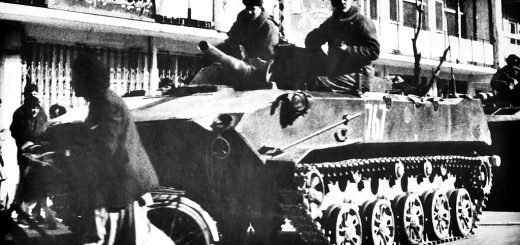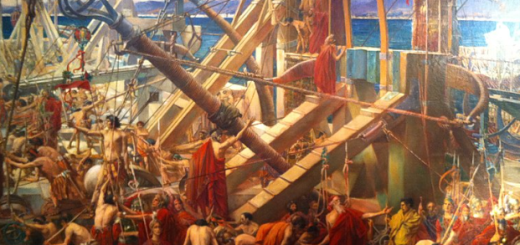Who was Arrhichion?
Arrhichion, also known as Arrhachion or Arrichion, was a renowned ancient Greek pankratiast, a participant in the combat sport of pankration. He lived during the 6th century BC and is particularly remembered for his extraordinary victory in the 54th Olympiad in 564 BC.
During the pankration match, Arrhichion found himself in a dire situation. His opponent had locked him in a chokehold, attempting to force a submission. Despite the chokehold tightening around his neck, Arrhichion refused to submit. Instead, he applied a desperate but effective tactic: with his last remaining strength, he kicked his opponent’s ankle, dislocating it. The pain caused the opponent to yield, even as Arrhichion succumbed to the chokehold and passed away.
Arrhichion’s remarkable victory, achieved even in the face of death, has made him an enduring figure in ancient Greek sports history. He is often celebrated as an exemplar of the unwavering spirit and determination displayed by athletes in pursuit of victory.
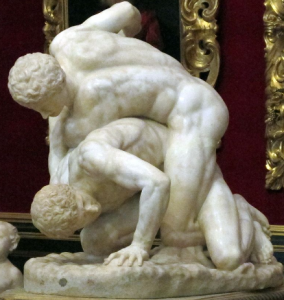
This statue is a Roman copy of a lost Greek original, circa 3rd century B.C. Uffizi Gallery, Florence, Italy
Questions and Answers
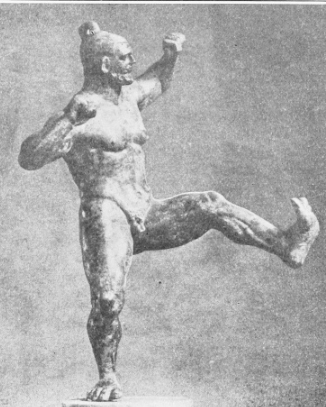
Bronze statuette of a Pankratiast, from the Hellenistic period, currently held at the Louvre, Paris.
What is Pankration?
Pankration was an ancient Greek combat sport that combined elements of boxing and wrestling. It was a highly physical and demanding discipline that tested the participants’ strength, skill, and endurance. The term “pankration” translates to “all powers” or “all-in-one combat” in Greek, reflecting the comprehensive nature of the sport.
In pankration, competitors were allowed to strike with punches, kicks, and open-handed strikes, as well as engage in various grappling techniques such as throws, holds, and submissions. The sport emphasized the use of both striking and grappling techniques, making it a versatile and dynamic form of combat.
Pankration matches took place in a controlled environment, typically in an amphitheater or stadium, and followed specific rules. While the sport had limited regulations, eye gouging and biting were prohibited. Otherwise, almost all forms of striking and grappling were allowed, providing a challenging and intense contest.
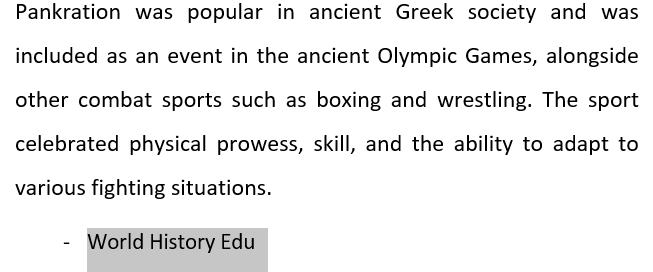
Why was Arrhichion celebrated?
Arrhichion was an ancient Greek pankratiast celebrated for his extraordinary victory in the 54th Olympiad. Known for his skill and unwavering determination, Arrhichion achieved legendary status by refusing to submit even in the face of death.
He was undoubtedly the most revered of all pankratiasts in ancient Greece.
What was Arrhichion’s sport or discipline?
Arrhichion’s sport or discipline was pankration, an ancient Greek combat sport that combined elements of boxing and wrestling. He excelled in this challenging and brutal discipline, showcasing his skills and determination in the arena.

What is the significance of Arrhichion’s victory in ancient Greek sports history?
Arrhichion’s victory holds great significance in ancient Greek sports history as a testament to the indomitable spirit and unwavering determination of athletes. His refusal to submit, even in the face of imminent death, embodies the ideals of courage, resilience, and honor that were highly valued in ancient Greek society. Arrhichion’s story continues to inspire athletes and serves as a symbol of extraordinary feats achieved in the pursuit of victory.
What were the key characteristics or skills that made Arrhichion a renowned pankratiast?
Arrhichion exhibited exceptional physical strength, enabling him to execute powerful strikes, throws, and holds in the arena.
Pankration required proficiency in both boxing and wrestling techniques, and Arrhichion demonstrated mastery in both disciplines, allowing him to excel in the hybrid combat style.
Arrhichion showcased remarkable endurance, enduring the physical demands and challenges of intense pankration matches.
His unwavering determination was a defining trait. He refused to submit even in the face of extreme circumstances, displaying an unyielding spirit and mental fortitude.
He possessed strategic thinking and a deep understanding of the sport. He was able to assess and exploit his opponent’s weaknesses, finding opportunities to secure victory.
Pankration bouts were unpredictable, and adaptability was crucial. Arrhichion demonstrated the ability to adjust his tactics and techniques to match the situation, making him a formidable competitor.

Who were the other ancient Greek Olympic pankration champions and athletes?
While specific records of ancient Olympic pankration champions are scarce, there are some notable pankratiasts who achieved fame and recognition in the ancient Greek world. Here are a few renowned pankratiasts:
- Polydamas was a renowned pankratiast from Skotoussa. Known for his immense strength, the Thessalian pankratist achieved fame for his numerous victories in pankration matches, earning him great respect among his peers and in the sporting community, especially during the 93rd Olympiad in 408 BC.
- Sostratos of Sicyon was an accomplished pankratiast who gained fame for his numerous victories, including at successive Olympiads in the middle part of the 4th century BC. He also competed in a number of Pythian Games in Delphi. Basically, he was known for his strength and skill in the arena.
- Dioxippus was a famous ancient Greek athlete who excelled in various combat sports, including pankration. He achieved great success in both the Olympic Games and other prominent sporting events of his time. It is even said that at some point no other athlete wanted to face him in the arena, making him earn the title “akoniti”. In one account of the story, he defeated a Macedonian athlete named Coragus in a match. According to the Greek historian Diodorus Sciculus, the match was attended by the famous Macedonian conqueror and king Alexander the Great. As Dioxippus was a Greek, his victory over Coragus was seen by the Macedonians as a humiliation. Desiring nothing than to get back at Dioxippus, the Macedonians framed him for stealing a golden cup. Dioxippus would end up taking his life as he could not stand the shame. It is said that Alexander the Great was deeply saddened by the demise of Dioxippus as he held the Greek pankratiast in very high regard.
How does Arrhichion’s story reflect the values and ideals of ancient Greek society?
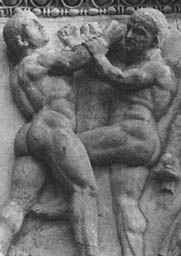
Pankratiasts portrayed on a Roman relief. 2nd or 3rd century A.D.
Ancient Greek society celebrated competitive sports and valued honorable conduct. Arrhichion’s participation in pankration and his adherence to the rules and customs of the sport reflected the Greek belief in fair play, integrity, and the pursuit of excellence with honor.
Arrhichion’s story emphasizes the significance of individual achievement and personal triumph. His victory, achieved through his own skill and determination, aligned with the Greek belief in the importance of individual agency and the ability to shape one’s destiny.

